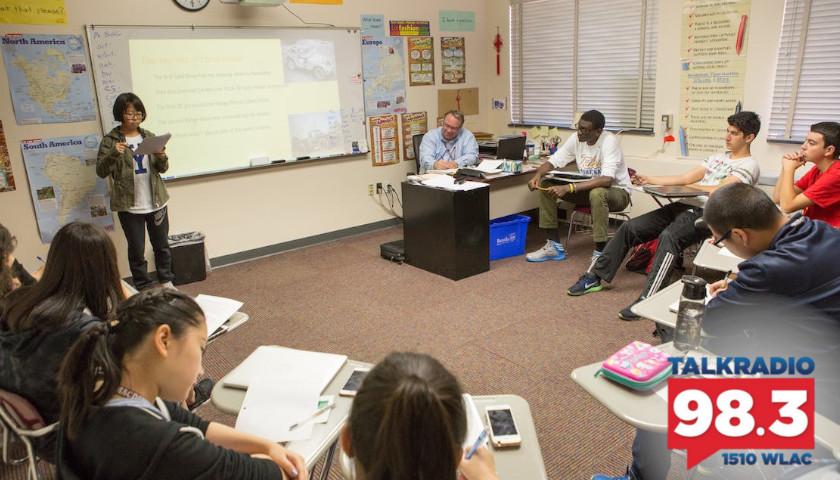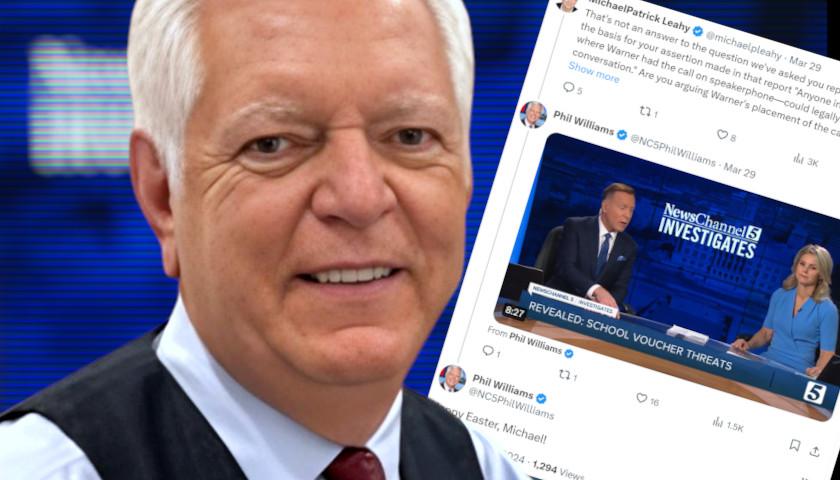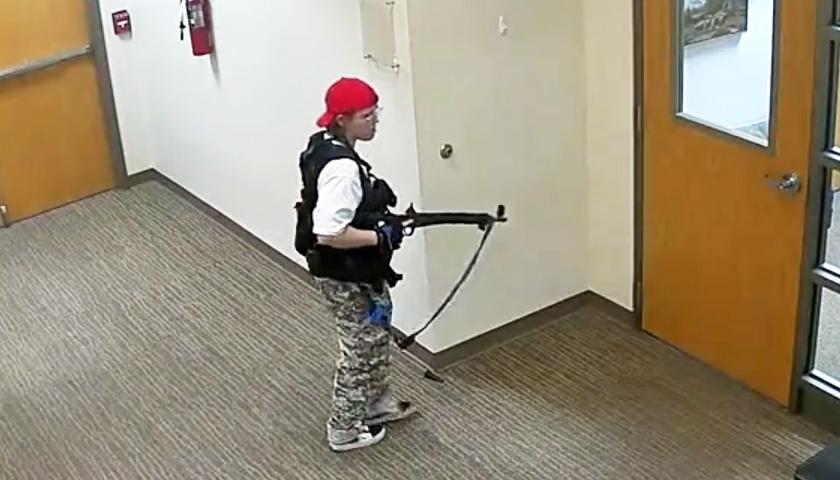Live from Music Row, Wednesday morning on The Tennessee Star Report with Michael Patrick Leahy – broadcast on Nashville’s Talk Radio 98.3 and 1510 WLAC weekdays from 5:00 a.m. to 8:00 a.m. – host Leahy welcomed the original all-star panelist and American Classical Education’s Philip Schwenk in studio to talk about the school’s main objective of working with local school boards and supply clarity to misinformation.
Leahy: In studio, the original all-star panelist, Crom Carmichael, also a very good friend, Phil Schwank, who’s with American Classical Education. Great background in education. Crom, you, and I were catching up on the process that Phil is going through with American Classical Education.
And just a reminder, the first time you were about a year ago in studio talking about all this stuff, Phil, it looks like you’ve got your capacity hearings before these school boards.
Carmichael: How many different school boards?
Schwenk: Five.
Leahy: And they’re in Maury County, Rutherford County, Robertson County, Montgomery County, and Madison County, which is the Jackson area.
Schwenk: Yes.
Leahy: And that those capacity hearings will be held over the next two months. And then the boards will vote over the next month or two after that. So we’ll know if you’ve got approvals. And as we talked about, it seems to me to be a total no-brainer, particularly in these areas where they are growing like crazy.
You mentioned something to me during the break that the idea here is you want to have a good, positive relationship with the local education agencies, it’s basically the county school boards. And then in some areas, we have city school boards, but it’s all before counties. So talk about that positive relationship that you develop with the local education agency.
Schwenk: Sure. One of the things that we’ve had to outline and it often gets, there’s a lot of misinformation, is that this is meant to be contentious and it’s not. We’re an organization, and I’m an individual that cares deeply about students. And my hope is to be in a dialogue with these local districts around those students and how we can work with them to do this work.
I think the only thing that there’s any kind of differentiation is we’re just basically advocating that parents should have a choice as to whether students go to school, but it’s not meant to be contentious. In fact, a lot of these, if we can, if we’re okayed or given a yes by these districts, the hope would be to be working with these districts in the work around these kids.
Leahy: Crom, choice that’s not contentious. Sounds like a pretty good idea to me.
Carmichael: I have a few questions about the schools that are open because I think as I was driving in, I think you said there’re 22 that are open. And you start with K-5 and then you add one a year…
Schwenk: That’s correct.
Carmichael: I guess up for seven years, and you’re adding to get to 12. Once it’s matured, how many students are in a school?
Schwenk: The model that we’re presenting would be around 700 kids.
Leahy: K-12?
Schwenk: Yes.
Leahy: By the way, it’s interesting about the school size. My dad was a principal in a school in upstate New York and every time there was this consolidation pressure, they wanted to centralize schools, and put them together. I went to one school that was K-12, 350 kids, another school, K-12 was 700 kids, another school, K-12 was like 1,400 kids. Every one of them had pressure to centralize and get bigger. Everything I’ve seen said that the best size school is like 500 for a thousand K-12, somewhere in that range. Is that right?
Schwenk: That’s absolutely true.
Carmichael: It’s the fact that it’s 12 or 13 grades. And so 13 grades divided into 700 is about 50-60 per class. That’s a pretty small class which means you can keep track of the educational achievements of each student. That’s a big deal. What percentage of those who attend school drop out?
Schwenk: Oh, very few. In the BCSI schools, the graduation rates of the various schools are well over 90 percent.
Leahy: And let’s be clear on the language, BCS is a Barney Charter School that uses a particular classical education curriculum. And they’ve been around for a while.
Carmichael: And then what percentage of those who graduate, which is almost all who attend, what percentage of those go on to college?
Schwenk: The majority. I would say 70, 80 plus. They all do something. Some go into the military. Some go into trades and learn skills and those types of things.
Carmichael: For those who aren’t particularly interested in college, do they have a trade? Are they qualified or do you help guide them as part of the guidance process upon graduation, saying, I think based on your educational results here and your aptitude and your interests here’s what we would encourage you to consider?
Schwenk: It’s the latter part of what you said, meaning that classical education is really about making a person literate, numerically sound, logical, reasonable, and a good human being. That’s what we’re trying to do. Our desire is when you have these, learned good people come out. Some will decide to go to college, some will go into the military, and some will go into the trades.
And that’s the idea, that we have good people who become lawyers, good people that become plumbers, good people that become soldiers so that when you start directing them, a lot of that comes out of the interest of those students because there’s a lot of kids that might be actually very strong academically that desire to go into like the military for example.
In fact, the military, a lot of kids that are going to the military are well-trained people academically. So it’s not our task as a classical school to direct them to a trade or occupation. It’s that they are able to reason learn, be rhetorically sound, good human beings that may decide to go in various directions.
Carmichael: You’re applying to five different school districts in middle Tennessee?
Schwenk: Yes, that’s correct.
Carmichael: If you were to get all five, do you all have the capacity to open five schools?
Schwenk: Oh, absolutely.
Carmichael: Wow. In 2024?
Schwenk: Oh, absolutely.
Leahy: Let’s use Maury County as an example, right? You say you would start K-five. What will happen is you do your capacity hearing before the school board in the next two months. And then they’ll make a decision. And let’s say you get a positive decision; you’re immediately going out and looking for a place for this K-5 school, right?
Schwenk: Oh, yeah. Oh, sure. Some of that, looking at a lesser level, is already happening. But obviously, if it became a real thing, we would be getting a facility, setting up the personnel, starting to look for teachers and administrators, and all the things that happen to put a school together. It’s a lot.
Leahy: Because we say, oh, why can’t it be this fall? And no.
Schwenk: Not in any reasonable capacity. (Laughs)
Leahy: He laughs hilariously.
Listen to today’s show highlights, including this interview:
– – –
Tune in weekdays from 5:00 – 8:00 a.m. to The Tennessee Star Report with Michael Patrick Leahy on Talk Radio 98.3 FM WLAC 1510. Listen online at iHeart Radio.




